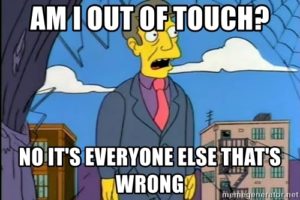When President Donald Trump announced that he was raising tariffs in an attempt to force other countries to lower trade barriers to American goods, All The Best People scoffed. That simply wasn’t the way the trade game was played, old bean. Other countries wouldn’t lower tariffs, they’d raise them on American goods and start a trade war, plunging the world into recession.
Well guess what?
President Trump announced during a Wednesday press conference that his meeting with European officials yielded key trade concessions, including an increase in American soybean and liquefied natural gas (LNG) exports to Europe, and a commitment to work toward eliminating non-auto tariffs entirely.
“We have agreed today to work toward zero tariffs, zero tariff barriers and zero subsidies on non-auto industrial goods,” Trump said, reciting a joint statement crafted with European Commission president Jean-Claude Juncker. “We will also work to reduce barriers and increase trade in services, chemicals, pharmaceuticals, medical products, as well as soybeans. The European Union is going to start almost immediately to but a lot of soybeans, they’re a tremendous market, to buy a lot of soybeans from our famers in the midwest primarily.”
“The European Union wants to import more liquefied natural gas from the United States and they’re going to be a very big buyer. We’re going to make it much easier for them but they will be massive buyers, so that they will be able to diversify their energy supply,” he added.
Trump pledged to “not go against the spirit” of ongoing negotiations, presumably by refraining from implementing further tariffs, and said he would “resolve” existing “retaliatory tariffs.”
Juncker also vowed to work toward reducing existing tariffs, which were first implemented last month in tit-for-tat fashion after the Trump administration slapped 10 and 25 percent tariffs on steel and aluminum respectively and the EU retaliated by placing tariffs on just over $3 billion in American goods. The E.U. trade chief also confirmed that he had in fact committed to importing more soy-beans and natural gas from the U.S.
The agreement comes after a series of reports Wednesday morning that indicated Trump is advocating the implementation of 25 percent tariffs on foreign-made cars, against the advice of his trade advisers. The specifics regarding auto tariffs were reportedly still being developed as Trump’s meeting with Juncker came to a close.
As always with trade agreements, the devil is in the details. If the EU does drop all the tariffs Juncker has promised, then this will be a big win for President Trump’s unorthodox negotiating style. His immediate presidential predecessors seemed to mostly leave the issue of achieving lower trade barriers to underlings negotiating multilateral agreements like TPP or GATT. President Trump is the first to pursue a policy of personally negotiating from strength to lower trade barriers to American commerce. This was a risky strategy that most (myself included) believed would not work. But right now it appears to be working.
There’s no doubt that if President Trump’s trade strategy does work, those decrying it now will still sniff at Trump “winning the wrong way” by “alienating allies…”



